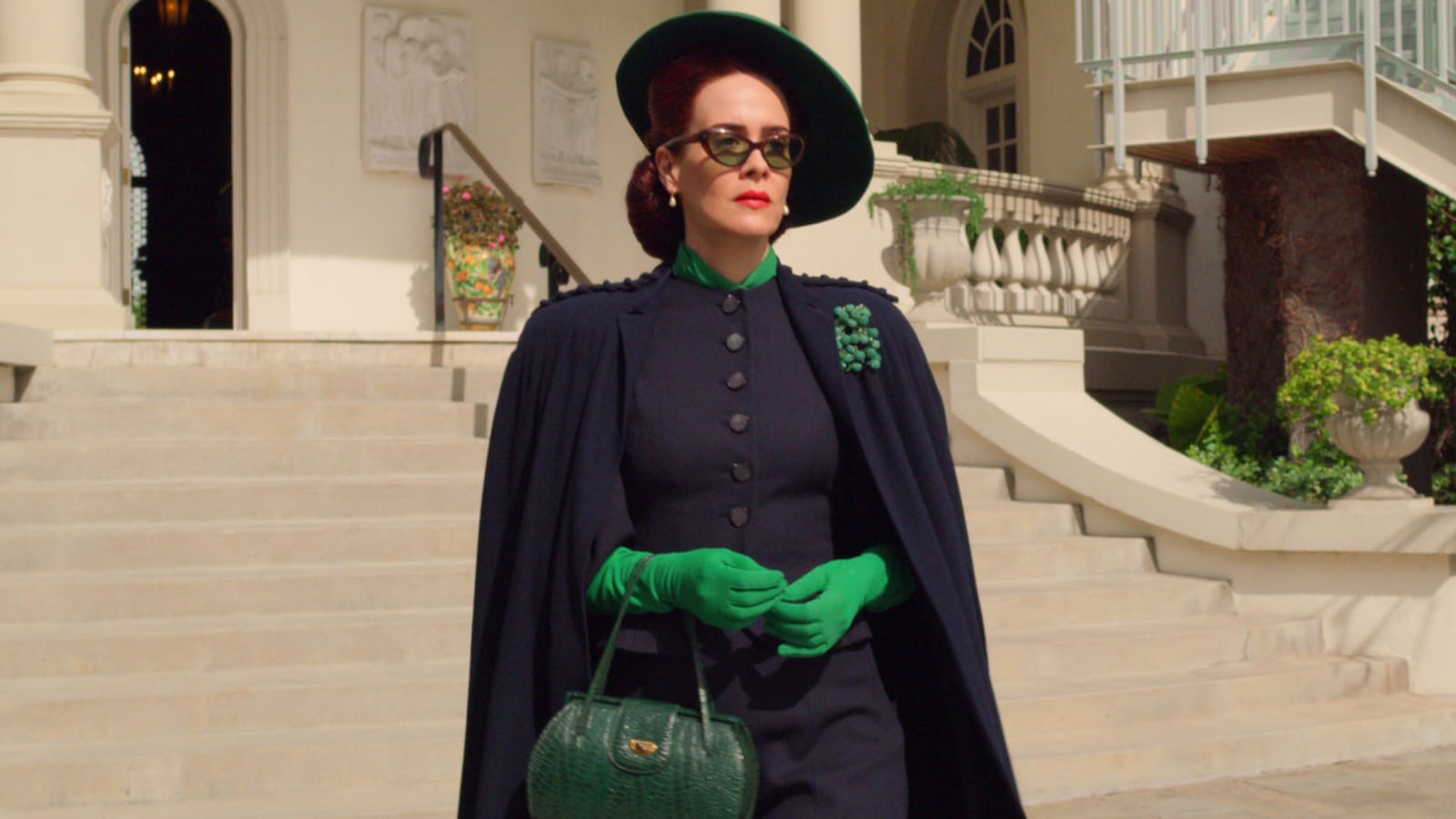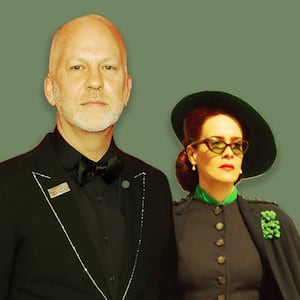This is a preview of our pop culture newsletter The Daily Beast’s Obsessed, written by senior entertainment reporter Kevin Fallon. To receive the full newsletter in your inbox each week, sign up for it here.
Early in the second episode of Ratched, Sarah Paulson and Judy Davis argue over a peach. At first, it seems like some throwaway dialogue. Then it goes on. And on. All told, it is one of the most intense scenes I’ve watched on TV this year, this argument over a peach. Elio from Call Me by Your Name is shaking. The cast of Parasite, scandalized.
The longer this peach argument went on, the more confusing it became—but also the more fabulous.
I have seen all of Ratched, and I still can’t rationalize the narrative decision to have Sarah Paulson and Judy Davis spend several minutes spitting vicious dialogue at each other over a stone fruit. But I relished every second of it. This ridiculous argument over a peach is the most invigorated I’ve felt watching TV in a long time.
The peach returns later in the series, a callback metaphor that is somehow both extremely on the nose but also kind of irrelevant and nonsensical. So in the spirit of Ratched, which hit Netflix Friday, I’m bringing up the whole peach thing as another inelegant metaphor here. No creative or narrative decision in the show really makes sense, and everything is much more intense than it should be. Yet you can’t help but be riveted and swept up. There’s something almost accidentally spellbinding about it.
I’m not sure it works at all as an origin story for Nurse Ratched, the iconic villain from One Flew Over the Cuckoo’s Nest. In fact, it renders her even more inscrutable. It’s tonally uneven and, thematically, occasionally problematic. But its production value is pristine—an art-deco fetishist’s fever dream—and the acting showcases sublime; again, Sarah Paulson and Judy Davis going absolutely bonkers over a peach.
As Ryan Murphy’s forays into Netflix programming skid all over the place (The Politician and Hollywood were similarly uneven), there is something addictingly fun about Ratched. It has a list of problems longer than most series I screen, but I also genuinely enjoyed it more than many series I legitimately recognize as “good,” whatever that standard is. If you can manage to divorce yourself from any expectations you had based on the Oscar-winning film and are willing to surrender to narrative lunacy, then Ratched is actually a bit of a delight.
Frequent Ryan Murphy collaborator Sarah Paulson is a great choice to do some Wicked-style “she wasn’t always evil” humanizing of Nurse Ratched, who ranks fifth on AFI’s list of greatest cinema villains. Paulson’s knack for empathy and emotional fireworks could see her humanizing a rock. Any scene she’s in sparks with rapturous nuance. Pair that with the smoking circuit breaker that is Judy Davis and an argument over a peach, and you have high art.
(A video went viral earlier this week praising Paulson as one of “the top tier white women” in Hollywood. “When I say white people, never ever am I talking about this lady right here,” @iwantafrankoceanalbum says in a TikTok, pointing at Sarah Paulson photos. “Any movie, any show, anything that this girl is on, it’s automatically a 10 out of 10. You don’t even gotta watch it.” She makes points.)
The series opens with the gruesome murder of priests who live together in a rectory. The culprit, Edmund (Finn Wittrock), is carted off to a mental health facility, where the doctor will determine if he’s fit to stand trial. Meanwhile, Mildred Ratched (Paulson) follows him there, lying her way into a job at the hospital. It is the babiest of spoilers—so beware—to say that Edmund is her brother. She’s there to protect him. At least I think.
The most frustrating thing about Ratched is you never really know what her agenda is, let alone where her morals actually lie. She’s manipulating and using everyone, to the point that when she’s earnest about her emotions—and, wow, are there extreme moments of earnestness here—you don’t know whether to believe her or if it’s more theatrics from an emotional puppet master.
Ratched is most comparable to a season of American Horror Story, with sumptuous visuals, shock and gore, and a Telenovela’s devotion to plot twists distracting you from any suspicion that there is no road map here. There’s no tangent that the plot doesn’t gleefully careen down. There’s no plot line that doesn’t reach a juicy climax, only to halt completely in the next episode for the introduction of something entirely new and indulgent.
And yet! Maybe it’s the extreme effort to be stylish, or the eagerness with which One Flew Over the Cuckoo’s Nest’s unsettling realism is transposed into a pulp-horror-thriller soap opera, but I got more excited about watching this show than many recent streaming options. Few shows invite overthinking more than this one. And few are better for not doing it.
It is a show about mental illness that, having little to no expertise on the matter, I can still say with almost certainty exhibited not an iota of understanding of how mental illness works. (Not the cruel therapies in the hospital; the terror of that is the point. But the depictions of multiple personality disorder and of psychopathy are... yikes.)
The bliss of any Ryan Murphy output, especially recent ones, is the performances. No one gives better showcases to so many actresses over 40 in such dynamically different roles, all in the same project.
Paulson is as good as you’d expect her to be, but then there’s also Davis doing Judy Garland-lite as a domineering, but misunderstood, head nurse. Cynthia Nixon is shoved through a gauntlet of trauma—she’s a closeted lesbian who is shot, almost dies, falls in love with a psychopath, and loses her job, and that’s just the first five sad things that happen to her—but sells the hell out of every scene.
Sharon Stone is a vengeful millionaire who walks around with a monkey wearing a dress on her shoulder. Amanda Plummer is a hilariously feral jazz baby. Sophie Okonedo is given a glaringly offensive character to play, but wrings out of it a tour de force, and Harriet Sansom Harris has like two scenes, but should win an Emmy for them.
Like The Politician and Hollywood, Ratched is a Choose Your Own Adventure of what to criticize and what to be grateful for in spite of it. It’s definitely an imperfect show, but I choose to embrace the peach.







